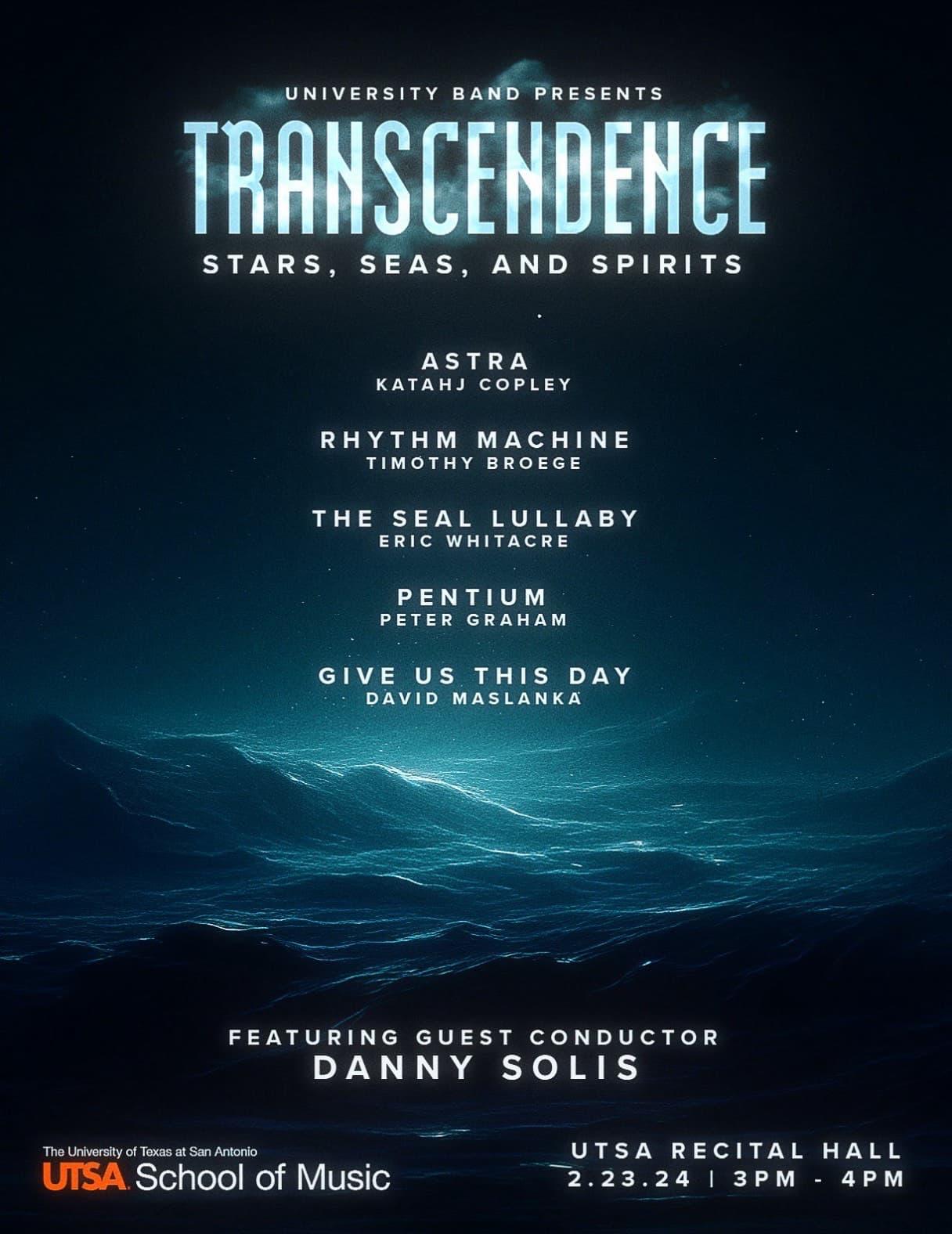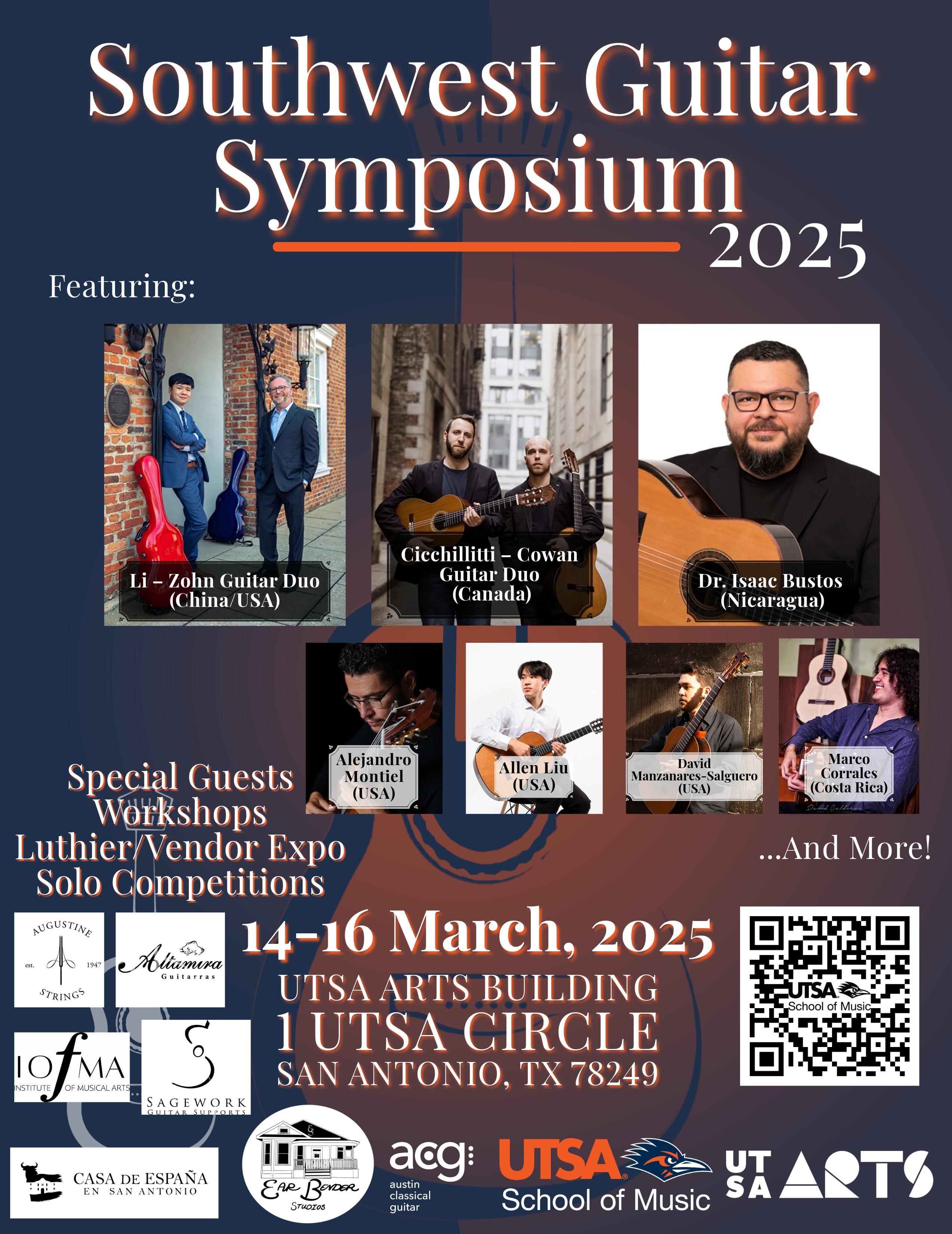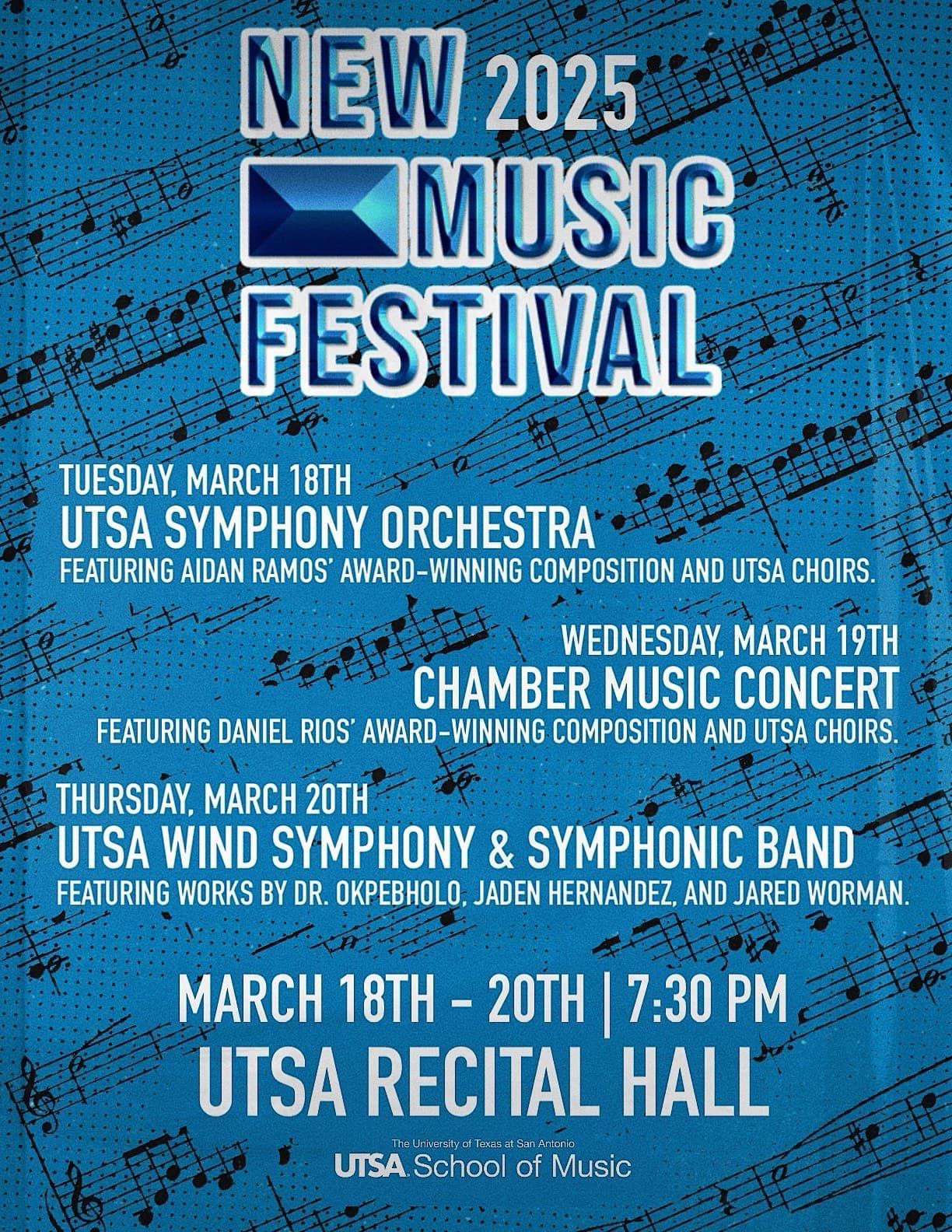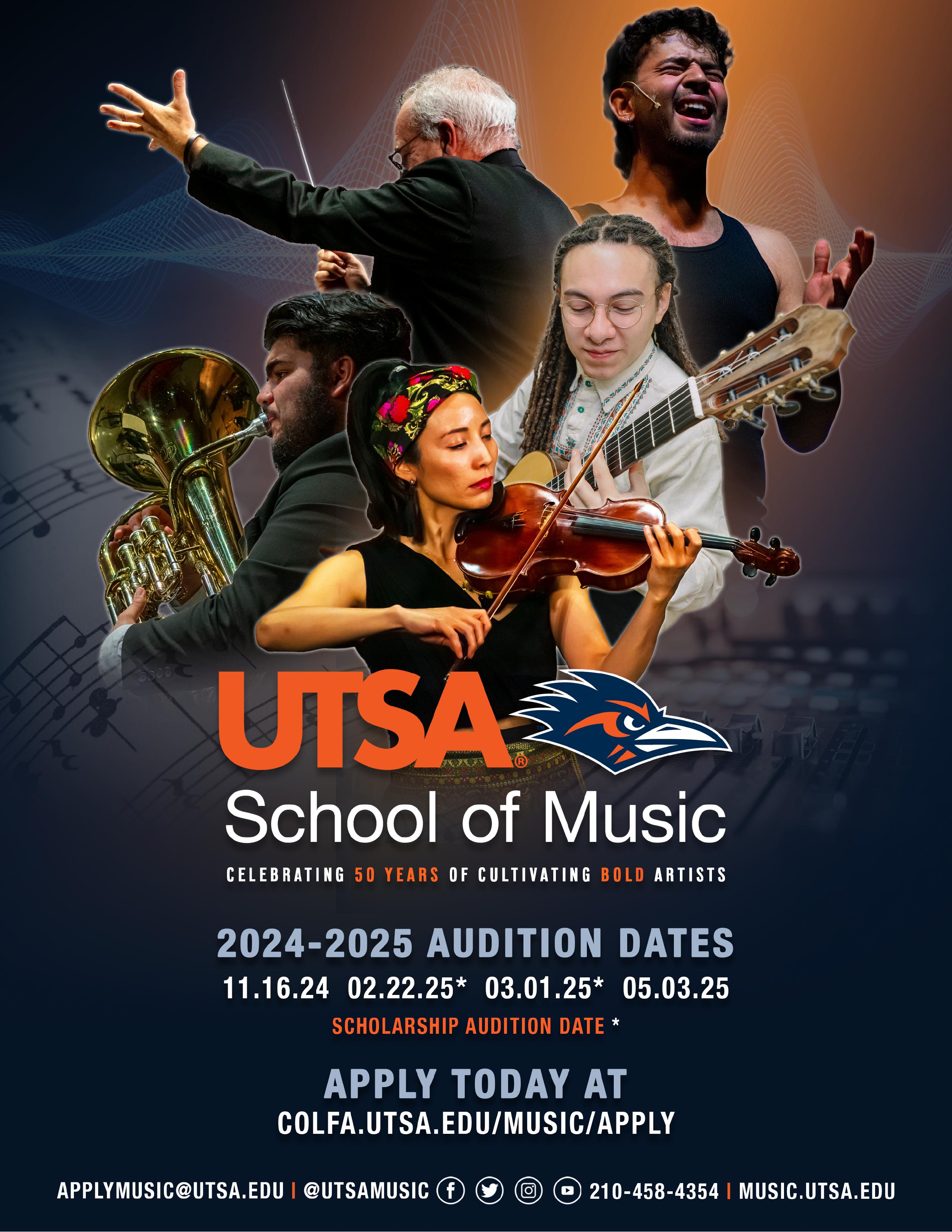

THE UNIVERSITY OF TEXAS AT SAN ANTONIO COLLEGE OF LIBERAL AND FINE ARTS SCHOOL OF MUSIC



THE UNIVERSITY OF TEXAS AT SAN ANTONIO COLLEGE OF LIBERAL AND FINE ARTS SCHOOL OF MUSIC
An-Lin Bardin, cello Naomi Niskala, piano
February 21st, 2025 | 7:30 p.m. | UTSA Recital Hall
This is a program of works commissioned by the Bardin- Niskala Duo. All works are preceded by personal videos from the composers.
EMIGRADO (2024)
La Bestia: The Train of Death (2023)
Ivette Herryman Rodriguez (b. 1982)
Victor Marquez-Barrios (b. 1977)
Fantasy (2022) Juantio Becenti (b. 1983)
INTERMISSION
Brisbane: Spring of 1987 (2023)
Breath Water Spirit (2022)
Melissa Dunphy (b. 1980)
Michael-Thomas Foumai (b. 1987)
HOME (2024) Michi Wiancko
I Molto rubato, ad lib (b. 1976)
II quarter = 82
III Singing
IV quarter = 92

THE UNIVERSITY OF TEXAS AT SAN ANTONIO COLLEGE OF LIBERAL AND FINE ARTS SCHOOL OF MUSIC
Born in 1982, Ivette Herryman Rodriguez grew up in Cuba and studied piano, music theory and composition. She holds a B.M in Music Composition from the Instituto Superior de Artes, in Havana, a M.M in Music Composition from Baylor University, and a M.M in Music Theory and D.M.A in Music Composition from Michigan State University. Her composition teachers include Juan Piñera, Scott McAllister, Ricardo Lorenz and Zhou Tian. Ivette’s music has been described as “absolutely exquisite” and “breathtakingly beautiful” (Kevin Noe-Artistic Director of the Pittsburgh New Music Ensemble and Director of Orchestras and Professor of Conducting at the UMKC Conservatory of Music). She is the composer of a bestseller piece for SSAA choir, and the winner, among other awards, of the 2023 President’s Award for Excellence in Scholarship and Creative Activities at SUNY Potsdam, a Chamber Music America grant (2021), the Illinois State Music Teachers Association (ISMTA) Composer Commissioning program (2019), a Brandon Fradd Fellowship in Music Composition (2015), and a Cubadisco Special Award for her zarzuela Cerca del Río (2010). She has been a fellow composer in three different programs with the Gabriela Lena Frank Creative Academy of Music. She has been Artist in Residency in Mexico, funded by The National Endowment for Culture and Arts (FONCA), and Artist in Residence with the Opera of El Salvador (OPES). Currently, Ivette is Assistant Professor of Theory and Composition at the Crane School of Music at Postdam, New York.
Ivette writes the following about EMIGRADO: "The idea I am using is rooted in the word Emigrado (emigrant). I am considered an emigrant when I return to Cuba to visit my family. In that context, that means that I have lost my rights as a person born there and I am treated as a tourist. Musically, I am using the letters of the word in its Spanish spelling to generate pitches. E sounds in Spanish as the termination of the solfege syllable re. So that's my first pitch. MI is solfege mi (or scale degree 3). That's my second note. GRA provides the notes: sol, re, la with solfege or scale degrees 5, 2, 6 in any scale. DO gives solfege syllable do, or scale degree 1 of any scale."
Venezuelan composer and guitarist Victor E. Márquez-Barrios, holds an extended catalog of works that includes compositions for a variety of solo instruments, numerous chamber ensembles, mixed choir, electronics, symphonic band, and symphony orchestra. His music has been performed, published, and recorded by soloists and ensembles from Latin America, the U.S., and Europe. Works by Márquez-Barrios have received performances at numerous international music festivals. An enthusiastic collaborator, Márquez -Barrios regularly works directly with performers and conductors, as well as with artists from a variety of disciplines beyond music. He has been awarded fellowships at some of the most prestigious artist residencies in the U.S., and has received grants and commissions from prominent institutions such as New Music U.S.A., the McKnight Foundation, the International Double Reed Society, and American Composers Forum. Márquez-Barrios holds M.M. and D.M.A. degrees in Composition from Michigan State University, as well as a Master ’s degree in Music Theory Pedagogy from MSU. He has served on the faculty at Michigan State, Kalamazoo College, Grand Valley State University, Alma College, and St. Lawrence University. Since 2015 and in parallel to his active career as a composer and guest lecturer, Victor Márquez-Barrios teaches music
theory and composition as part of the faculty at Truman State University, where he is also the founding director of Uncommon Practice, the University ’s contemporary-music ensemble. During the summer, Márquez-Barrios teaches at Interlochen Arts Camp in Michigan.
About La Bestia: The Train of Death, Victor writes "As of February 2023, more than 7 million people (around 25% of the country's population) have left Venezuela since 2014, which makes it the largest-ever refugee crisis in Latin American. While the majority of displaced Venezuelans went to other countries in Latin America and the Caribbean, a significant amount of migrants have come to the U.S., through the dangerous Darién Gap between Colombia and Panamá, and eventually climbing aboard a freight train known as "La Bestia," or "The Beast." In recent years I have been both shocked and saddened to hear Venezuelan voices in. numerous interviews and news reports about the migrant crisis at the U.S. border. Of those, the ones that strike me the most are the voices of children, traveling north by themselves or with their families. This composition is both an attempt to raise awareness about this humanitarian crisis, and a lullaby for those children, my personal way of encouraging them to keep dreaming despite the challenges, and to try and convince them (and myself) that the storm will pass, and that there will be calm and better days ahead for all."
Juantio Becenti (Diné/Navajo) lives in the four corners area of New Mexico close to his birthplace on the Navajo Nation. He began composing music at a young age and received his first commission from the Moab Music Festival in 1998. He has since received commissions from Dawn Avery (North American Indian Cello Project), Raven Chacon (Native American Composers Apprenticeship Program), Michael Barrett (New York Festival of Song), George Steel (Abrams Curator of Music, Isabella Stewart Gardner Museum), and others. His compositions have been performed by the Phoenix Chamber Orchestra, Dawn Avery, ETHEL, America’s premier postclassical string quartet, and the Claremont Trio. He has studied at the Walden School for Young Musicians which he attended on full scholarship. He was the recipient of a grant from the First Nations Composers Initiative which he received in order to create original music for the film “Two Spirits,” a documentary about the life and murder of Fred Martinez, a transgendered Navajo teenager.
About the Fantasy, Mr. Becenti writes “music is a healing force and a mode of expression that people universally fall back onto for healing and other fundamental human needs...I’ve selected a Navajo song called Shi Naasha that was composed after the Navajo left Ft. Sumner where they had been imprisoned for numerous years after conflicts with the US, Mexico, and various other Native American tribes aligned with the US. After a period of conflict the Navajo were rounded up in 1864 and forced on a walk from our traditional homelands to an internment camp 300+ miles away. Many Navajo died during that journey, and those who survived were imprisoned until 1868 when a treaty was signed. The Navajo homeland is bordered by four mountains with the southernmost being called Tsoodzil (turquoise mountain), or Mt. Taylor, in New Mexico. When the returning Navajo saw the mountain they were overcome with joy and composed Shi Naasha. It talks about going in beauty and freedom."
Raised in a Chinese-Australian family, Melissa Dunphy moved to the USA in 2003 and has since become an award-winning and acclaimed composer specializing in vocal, political, and theatrical music. She first came to national attention when her large -scale work the Gonzales Cantata was featured in The Wall Street Journal and on The Rachel Maddow Show. Dunphy is the recipient of an Opera America Discovery Grant for Alice Tierney, a new opera commission by Oberlin Conservatory premiering in 2023. Recent commissions include works for the BBC Singers, VOCES8, and Mendelssohn Chorus. Dunphy is also a Barrymore Award-nominated theater composer and Director of Music Composition for the O'Neill National Puppetry Conference. Dunphy has a Ph.D. in composition from the University of Pennsylvania and a B.M. from West Chester University and teaches at Rutgers University. She lives in Philadelphia with her husband, Matt; the Dunphys are co-hosts of the popular podcast The Boghouse about their adventures in Philadelphia colonial archaeology.
Melissa writes "Brisbane: Spring of 1987 is a response to Samuel Barber's art song Knoxville: Summer of 1915, which sets a prose poem by James Agee. The text is a snapshot recollection of a summer evening in Agee's hometown when he was six years old; the following year Agee's father died in a car accident, which led to chaos in his family. I grew up in Brisbane, Australia, and in late spring of 1987, when I was seven years old, my mother had her first major episode of bipolar disorder, which led to a lot of chaos in my family. Interjecting themselves in the piece are Cantonese nursery rhyme melodies which my mother would play for me on cassette tapes. My mother was a refugee from the Chinese Cultural Revolution, and her traumatic experiences probably contributed to her mental illness. The nursery rhymes at first seem very innocent and light, but they quickly overlap and become manic. So, there's always a mixture of light and dark going on in this piece."
Michael-Thomas Foumai (b. 1987) is a composer of contemporary concert music and educator with work focusing on storytelling and the history, people and culture of his Hawaiʻi home. His music has been performed by Yannick Nézet-Séguin and the Philadelphia Orchestra, George Manahan and the American Composers Orchestra at Carnegie Hall, Osmo Vänskä and the Minnesota Orchestra, and in the summer of 2021, the Hawaiʻi Symphony Orchestra presented a festival of his music with over 30 performances conducted by Rei Hotoda, Lidiya Yankovskaya, Sarah Hicks and JoAnn Falletta. Honors for his music have included a Fromm Foundation Grant from Harvard University, the MTNA Distinguished Composer of the Year Award, the Jacob Druckman Prize from the Aspen Music Festival, and three BMI composer awards. Foumai holds multiple degrees in music composition from the University of Hawai‘i at Mānoa (BM) and the University of Michigan (MM, DMA).
Michael writes "Breath Water Spirit is about identity; the name ancient Hawaiians gave their new home and the name of my home. I hoped to capture this ancient natural spirit of the Hawaiian islands using the melodic contours of Hawaiian chant. These fragments of a chant undergo a tumultuous passage through time that implies, at the start, the undiscovered Hawai'i island, the arrival of the Hawaiians, the ancient battles for unification under Kamehameha I, through the overthrow, and beyond."
A versatile and highly imaginative collaborator, performer, and composer, JapaneseAmerican Michi Wiancko has been commissioned by artists and ensembles throughout the country, and both her creative and organizational work prioritize not only artistic discovery, but community resilience and social change. Recent commissions and projects include works for Boston Chamber Music Society, Parker Quartet, Ensemble Connect, SPCO, Aizuri Quartet, Jupiter Quartet, American Ballet Theater, Anne Akiko Meyers, Cleveland Lyric Theater, and Experiments in Opera, among many others. Michi performed her violin solo debuts with the New York and Los Angeles Philharmonics, and her recital debut in Weill Hall. She released her solo album, Planetary Candidate on New Amsterdam Records, and the solo violin works of Émile Sauret on Naxos. A passionate collaborator and advocate for new music, Michi has worked with Gabriela Lena Frank, Missy Mazzoli, Vijay Iyer, Judd Greenstein, William Brittelle, Qasim Naqvi, Jessie Montgomery, Laurie Anderson, Steve Reich, Emmanuel Ax, Silkroad, East Coast Chamber Orchestra, The Knights, A Far Cry, Alarm Will Sound, and International Contemporary Ensemble. Her mentors include Donald Weilerstein and the late violinist and composer Robert Mann. Michi is the director of Antenna Cloud Farm, a festival, retreat, and community organization, and she recently launched The Experimental Institute in collaboration with Mazz Swift and PaviElle French.
About HOME, Michi writes "In 1942, U.S. Executive Order 9066 called for the forced imprisonment of 110,000 of Japanese descent, including children, the elderly, and the sick, for the duration of the war. Often referred to as “relocation,” the government stole from these families their homes, personal property, businesses, and livelihoods, and moved them into internment camps in remote inland locales. 70,000 of the incarcerated people were full American citizens, born and raised in the U.S., with zero charges of disloyalty amongst them. My piece for The Bardin-Niskala Duo is inspired by this community of folks who faced and endured this unimaginably painful time of fear, racism, violence, and injustice with courage and grace, and who found solace and resilience in their families and in their own cultural heritage."

The Bardin-Niskala Duo (cello and piano) is a nonprofit ensemble that uses music to explore notions of identity, belonging, and community to fight racism, promote cultural awareness, and celebrate humanity. The Duo commissions ALAANA (African, Latinx, Asian, Arab, and Native American) and other under-represented composers to write pieces that are based around folksongs and children's songs of their particular cultures and countries.
Through these commissions and the performances of these works the Duo promotes these composers and opens dialogue with and amongst audience members on the notions of homeland, community, and belonging, on the complexity and uniqueness of various cultures, and on the challenges of navigating life in this country as a bi-cultural, multi-cultural, or minority person. Each commissioned work is preceded by a personal video message from the composer, where they discuss their own journey towards identity and a sense of belonging, their community, and the historical or personal significance of the folk or children’s song they chose as an inspiration for their work.
Formed in early 2021, the Duo has performed across the United States from Mississippi to Minnesota and Hawai’i to New York. They have presented at regional and national conferences and have been awarded four residencies at the Avaloch Farm Music Institute. Their performances are offered in concert halls, schools, universities, and community centers, and range from traditional concerts to more informal performances mingled with open dialogue between the Duo and audience members. Active educators, the Bardin-Niskala Duo works with students of all ages in master classes and workshops and also co-directs the Winterhaven Chamber Music Retreat, an adult amateur chamber music festival held in January in New Hampshire.

www.Bardin-Niskala-Duo.com

An-Lin Bardin, cello Naomi Niskala, piano
An-Lin Bardin, cellist
Described as “stunning,” by the New York Times, cellist An-Lin Bardin currently freelances and teaches both music and math in the greater NYC area. As the cellist of the Vinca Quartet, she performed extensively throughout Europe and the US, including Carnegie’s Weill Hall, Aspen, and Vilar Performing Arts Center. Bardin’s performances have been broadcast on Deutschlandradio and WNYC. She is a laureate of several international quartet competitions, including the Paolo Borciani Quartet Competitions in Reggio Emilia, Italy, and the Fischoff, the Plowman, the Yellow Springs, Chesapeake, and the International Chamber Music Ensemble Competitions in the United States. A recipient of a DAAD fellowship which enabled her to work with the Vogler String Quartet in Stuttgart, Germany, Bardin also studied extensively with Gunter Pichler and Valentin Erben of the Alban Berg Quartet, Walter Levine, Heime Mueller, and the Artemis String Quartet under the auspices of the ProQuartet program in Paris, France, and with the Emerson String Quartet through the Carnegie Hall Chamber Music Workshops. She was a graduate assistant to the Takacs Quartet at the University of Colorado at Boulder for two years as part of the graduate quartet residency program. A strong proponent of music education, Bardin was a founding member of Music Haven, an intensive mentorship program serving youth from low-income neighborhoods in New Haven, Connecticut. She also founded two ongoing music educational programs in rural Washington State through the Gorgeous Sounds Residency Program. Raised in California by two nuclear physicists, Bardin began her cello studies at the age of eight with Irene Sharp. She holds a B.S. from Yale University in Geology and Geophysics, and an M.M. from the Yale School of Music, where she studied with Aldo Parisot and was a member of the Grammy-Award-winning Yale Cellos.
Naomi Niskala, pianist
A soloist and chamber musician who has appeared in Europe, North America, Russia, Israel, Thailand, and Japan, pianist Naomi Niskala's performances have been broadcast on BBC Radio, Deutschlandradio, RTV Germany, and NPR’s Performance Today. Niskala performs regularly with Spectrum Concerts Berlin, one of Germany’s leading chamber organizations, and has also recorded two discs with them. Recent performance highlights include the San Francisco Symphony Chamber Series at Davies Symphony Hall, soloist with the St. Petersburg Chamber Philharmonic of Russia, and solo and chamber performances with Spectrum Concerts Berlin in the Philharmonie Kammermusiksaal of Berlin, Carnegie’s Weill Hall, in Thailand, and in Kosovo. Her release of the only complete recordings of American composer Robert Helps’s solo piano works on two discs with Albany Records in 2007 was met with high acclaim, and she has also recorded piano chamber works of Robert Helps and Ursula Mamlok with Spectrum Concerts Berlin for two discs on Naxos, as well as the world premiere of Mamlok’s 2015 quintet “Breezes” for Bridge Records. Niskala is featured in the 2013 German rbb television documentary entitled “Sehnsucht Musik” (Searching for Music), documenting the work of four members of Spectrum Concerts Berlintowards improving the harsh conditions for young musicians at a music school located in Prizren, Kosovo. Born to Japanese/Finnish-American parents, she began studying piano at the age of three, raised in Rochester, New York and then later in Tokyo, Japan. Niskala holds degrees from the Yale School of Music, Stony Brook University, and the New England Conservatory of Music, where she studied with Claude Frank, Gilbert Kalish, and Patricia Zander. She also worked with pianists Leon Fleisher, Menahem Pressler, Peter Serkin, and Maria Louisa Faini, and violinists Louis Krasner and Eugene Lehner. Niskala is currently Associate Professor of Music at Susquehanna University in Pennsylvania, where she teaches piano and theory, and leads a summer chamber music exchange program to Japan.


Celebrating the School of Art & School of Music Presents
Tobin Center for the Performing Arts Tuesday, March 4th







